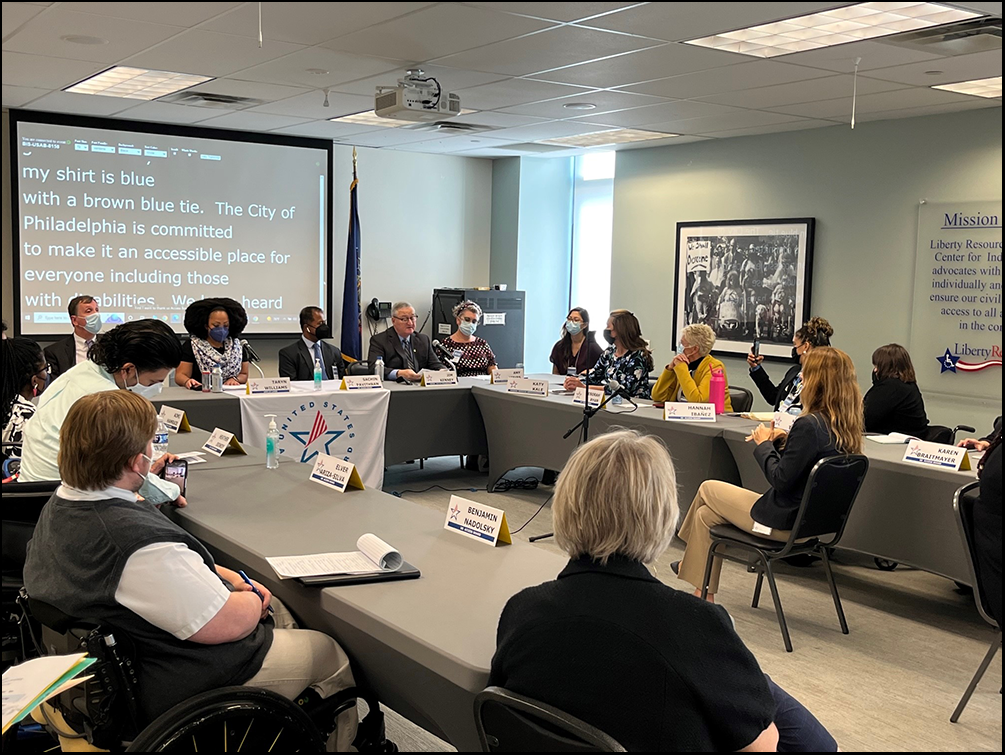U.S. Access Board Holds Town Hall Meeting in Philadelphia
This article is part of a series on the U.S. Access Board’s visit to Philadelphia from September 13 – 15
During the U.S. Access Board’s visit to Philadelphia last week, the Board held a public town hall meeting to hear from the local community about the state of accessibility in the region. The town hall meeting was held at Liberty Resources, Inc., Philadelphia’s Center for Independent Living. Ten presidentially-appointed public Board members were present, as well as federal members Taryn Williams, Assistant Secretary of Labor for Disability Employment Policy at the Department of Labor, and Katy Kale, Deputy Administrator at the General Services Administration.
Board Chair Williams opened the town hall by highlighting the Board’s activities in Philadelphia, including site visits to learn about accessibility at the National Park Service’s Independence Historical National Park and Philadelphia Parks and Recreation; attendance at a panel on accessible design for neurodivergent individuals at Temple University; an exploration of emerging accessible technologies for the arts; and the experience of navigating pedestrian routes in Philadelphia’s public rights-of-way. Chair Williams also mentioned the Board’s seven accessibility trainings held in Philadelphia, including a training on accessibility of historic buildings and facilities. The presentation materials for most of the trainings are available in the Board’s news article “U.S. Access Board Holds Accessibility Trainings in Philadelphia.” Board Executive Director Sachin Pavithran reviewed the Board’s structure and mission, and Board General Counsel Chris Kuczynski described the Board’s rulemaking process and current regulatory agenda.
Following the opening remarks, community members testified about a range of concerns, including accessibility barriers at a local post office; accessibility issues in the public right-of-way; lack of services for adults with developmental disabilities; lack of communication access at medical appointments, job interviews, and on public transportation; and unavailability of accessible at-home COVID tests. Speakers highlighted the substantial percentage of Philadelphia residents with disabilities (over 16%) and concerns regarding accessibility in the City’s numerous historic buildings.

The town hall also included remarks from City of Philadelphia Mayor Jim Kenney and Amy Nieves, Executive Director of Philadelphia Mayor’s Office for People with Disabilities. Nieves discussed the Philadelphia Disabilities Characteristics Map, which provides a visual representation of the City’s population of persons with disabilities by census tract. The Map, which was developed in collaboration with people with disabilities, is being used as a planning tool for local government services. Tom Earle, CEO of Liberty Resources, Inc. also provided remarks on the work of his organization in advancing accessibility in Philadelphia.
Following the town hall meeting, the Board and members of the public continued conversations on accessible design and disability issues at the networking reception, sponsored by The Sierra Group Academy, Tamman, Inc., and the Mid-Atlantic ADA Center.
The Board provides training, webinars, and technical assistance on federal accessibility standards, and enforces the Architectural Barriers Act of 1968, which requires that federal buildings and facilities be accessible to persons with disabilities. Complaints regarding access in federal buildings, such as post offices, social security offices, federal courts, and VA hospitals, can be filed via the Board’s online complaint form.
Read more about the Board’s visit to Philadelphia in the following articles:
- U.S. Access Board Holds Accessibility Trainings in Philadelphia
- U.S. Access Board Attends Panel on Accessible Design for Neurodiversity
- U.S. Access Board Visits National Park Service’s Independence National Historical Park
- U.S. Access Board Visits Philadelphia Parks and Recreation Department for Discussion with Commissioner and Community Partners
- U.S. Access Board Participates in Demonstration on Emerging Technologies for Accessible Art
- U.S. Access Board Visits Inglis Innovation Center and Attends Disability Art Show

